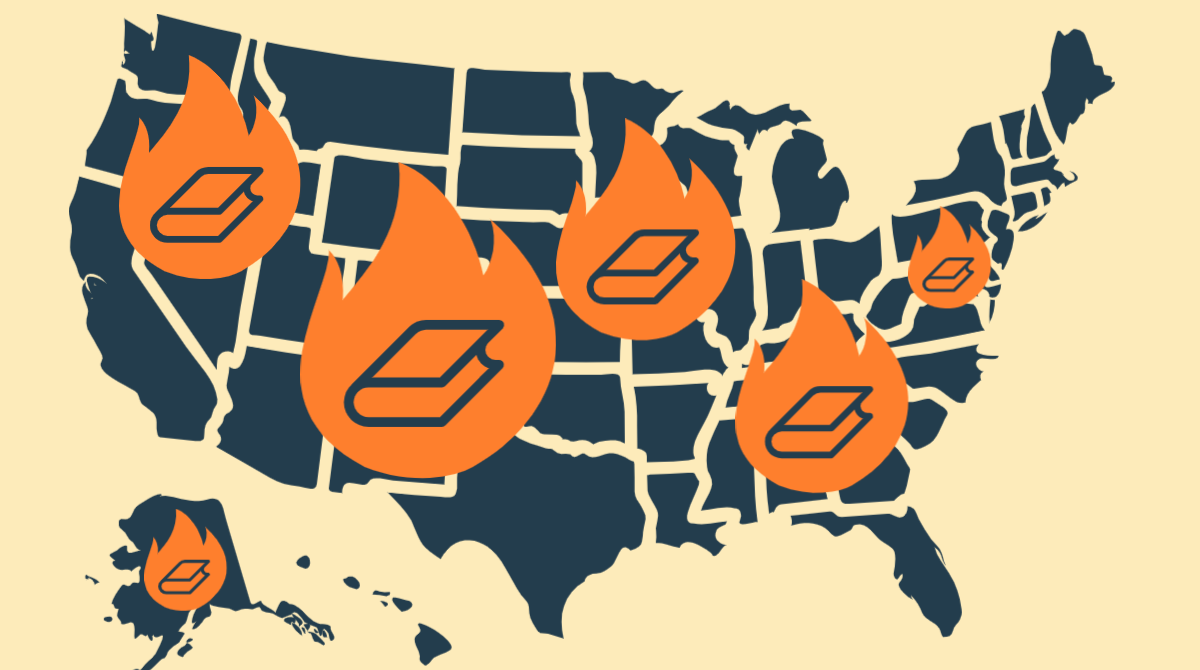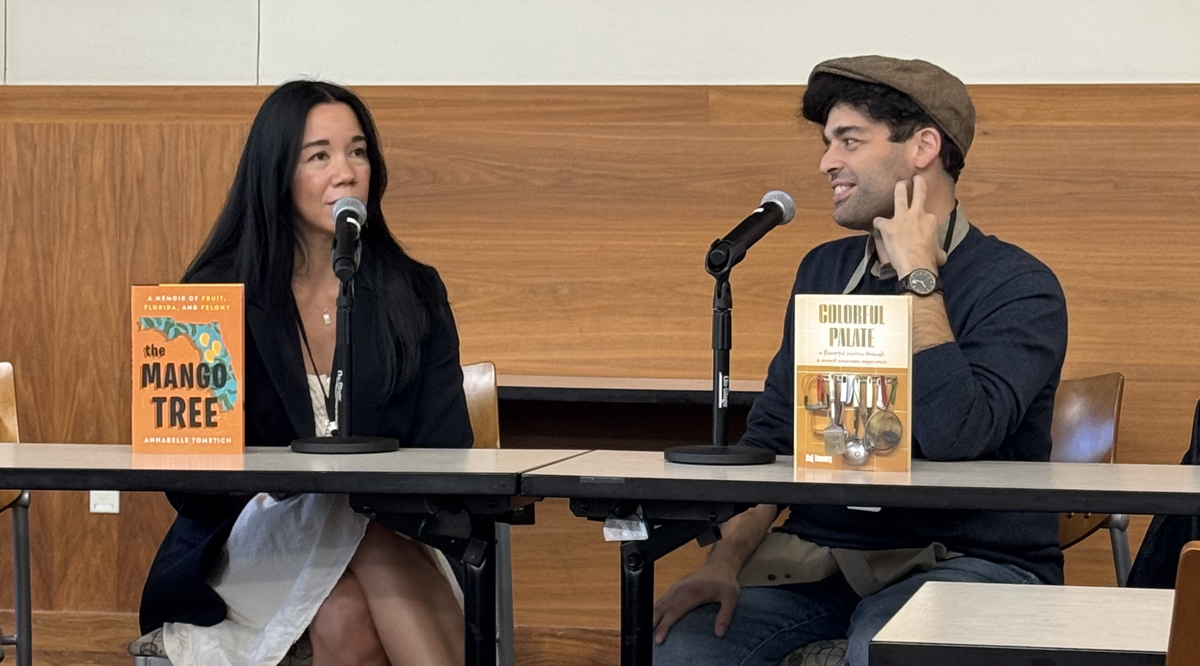Libraries and schools across the country are experiencing unprecedented levels of attempts to ban or remove books from their shelves. I Love Libraries will continue to raise awareness by highlighting attempts to censor library materials, as well as efforts by librarians, parents, students, and concerned citizens to push back against them. This report includes news from Wisconsin, Iowa, and Nebraska, as well as info on a lawsuit brought by major publishers against the state of Florida over book bans.
Wisconsin school board votes against banning books
The school board of Oshkosh, Wisconsin, voted not to ban six books at an August 28 meeting, reports NBC 26. The decision puts to rest a months-long effort by a local parent to ban the books.
In February, the parent requested to ban six books at Oshkosh West High School. The six books were: “Gender Queer,” by Maia Kobabe, “Milk & Honey,” by Rupi Kaur, “Let’s Talk about it,” by Erika Moen, “Fun Home,” by Alison Beckdel, “Anatomy of a Boyfriend,” by Daria Snadowsky, and “Anatomy of a Single Girl,” by Daria Snadowsky.
The request to ban the books was denied on March 10 by the Oshkosh West High School principal and media specialist. The parent then appealed the decision to the assistant superintendent on May 25. The assistant superintendent upheld the principal’s decision on July 1 and once again denied the request to ban the books. The parent appealed to the school board on July 31, who reviewed the books before denying the request again at the August 28 meeting.
Public comment was cut short at the August 28 meeting after anti-book ban supporters spoke and two people who supported the ban were removed for disruption.
The board voted 6 -1 to keep the books on the shelves at Oshkosh West High School. A request to ban the six books listed cannot be made again for five years.
Iowa school district removes 50 books
Dubuque (Iowa) Community Schools officials have removed 50 books from circulation in the district in compliance with a 2023 Iowa law, reports the Telegraph Herald.
The books, which include bestselling novels such as “I Know Why the Caged Bird Sings” by Maya Angelou and “Slaughterhouse Five” by Kurt Vonnegut, were removed in accordance with Senate File 496.
Among other provisions, the law requires schools to remove from their libraries and classrooms books that are not “age-appropriate” or that include “descriptions or visual depictions of a sex act.” It also forbids teachers from discussing gender identity and sexual orientation issues with students in sixth grade or younger.
Eight books that were removed at the elementary level all came from libraries and were removed due to the provision of the law prohibiting discussion of gender identity and sexual orientation issues with students in sixth grade or younger. Among the books removed were “This Day in June” and “Sewing the Rainbow” by Gayle Pitman, which depict a Pride celebration and the creation of the first rainbow Pride flag, respectively. Several of the elementary books were removed due to descriptions in their glossaries or end notes, rather than the main storyline.
Nebraska governor appoints book-ban proponent to state library commission
The Republican governor of Nebraska has appointed a new member to the Nebraska Library Commission-a former local school board member removed from office after trying to ban more than 50 books, reports ABC News.
Governor Jim Pillen appointed Terri Cunningham-Swanson to serve on the board responsible for promoting, developing, and coordinating library services in Nebraska. Cunningham-Swanson was elected to the Plattsmouth (Neb.) Community Board of Education in 2023 and immediately sought to ban 52 books from the school library, including “The Handmaid’s Tale,” “Where the Crawdads Sing,” and “The Perks of Being a Wallflower.” Many of the books on the list involved themes of addiction, race, and sexuality.
High school students in Plattsmouth walked out in protest and the high school librarian resigned in response to the ban effort. The Plattsmouth school board convened a committee to review the books and removed one, while others were placed in a restricted section.
After one failed effort, voters in the district collected enough signatures last November for a ballot question of whether to recall Cunningham-Swanson. In January, 62% of voters voted to recall her.
Cunningham-Swanson’s appointment has angered some in Plattsmouth.
“Our community rejected Cunningham-Swanson’s extremism by an overwhelming margin in January,” Jayden Speed, who led the recall effort, posted on the social platform X. “Book bans have no place in Nebraska! We will continue the fight to keep it that way.”
Major publishers sue Florida over ‘unconstitutional’ book ban law
Six major book publishers have sued the state of Florida over what they call an “unconstitutional” book ban law that allows challenges to books in school libraries, reports The Hill.
The publishers-Penguin Random House, Hachette Book Group, HarperCollins Publishers, Macmillan Publishers, Simon & Schuster, and Sourcebooks-along with The Authors Guild and some prominent book authors, filed the 94-page lawsuit in federal court in Orlando August 29.
The plaintiffs argue in the suit that book bans have surged, in violation of the First Amendment, because of the passage of Florida’s 2023 education bill, H.B. 1069. The bill allows parents to try to remove materials from schools if they are seen as pornographic by the school boards.
The plaintiffs argue Florida “has mandated that school districts impose a regime of strict censorship in school libraries” and that the law “requires school districts to remove library books without regard to their literary, artistic, political, scientific, or educational value when taken as a whole.”
The complaint states that hundreds of books have been banned, including “A Tale of Two Cities” by Charles Dickens and “The Diary of a Young Girl” by Anne Frank.
Take action
Alarmed by the escalating attempts to censor books? Here are five steps you can take now to protect the freedom to read.
- Follow news and social media in your community and state to keep apprised of organizations working to censor library or school materials.
- Show up for library workers at school or library board meetings and speak as a library advocate and community stakeholder who supports a parent’s right to restrict reading materials for their own child but not for all
- Help provide a safety net for library professionals as they defend intellectual freedom in their communities by giving to the LeRoy C. Merritt Humanitarian Fund.
- Educate friends, neighbors, and family members about censorship and how it harms communities. Share information from Banned Books Week.
- Join the Unite Against Book Bans movement and visit our Fight Censorship page to learn what you can do to defend the freedom to read in your community.
Subscribe to the I Love Libraries newsletter! You’ll get monthly updates on library news, advocacy updates, book interviews, book info, and more!




